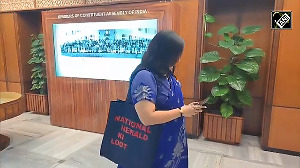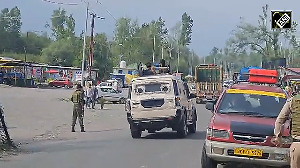It's tough to tell when Sukhbir Singh Badal is being a professional politician and when he's doing business. One moment he's talking on the phone to a person in Amritsar.
"Just get on to the case, yaar," he tells the person on the other end. "This is a human rights abuse case. We have to work on it and get them out."
That's followed by another call and he slips into colloquial Punjabi. "Bt Cotton is banned in Punjab. As a result, farmers from Punjab are buying spurious Bt cotton seeds. When the crop fails, they blame the seed variety. We met the agriculture minister and told him: what is the point? Why not lift the ban? He has told us Punjab will be given permission to sow Bt cotton next year. Please give this issue wide publicity."
Badal is one of a growing tribe: the businessman in politics. They may be landowners turned entrepreneurs like Badal or they may be from a bidi manufacturing clan like Civil Aviation Minister Praful Patel. Whatever their business interests there are more of them in the 14th Lok Sabha than ever before -- and they are on both sides of the House.
They are, undoubtedly, a varied bunch. From Kerala, there's M P Veerendra Kumar, owner of the Mathrubhumi, one of the country's largest newspapers.
At another end of the spectrum, there's Naveen Jindal who stood for election from Kurukshetra, Haryana and is also a scion of the giant Jindal empire. There's also the omnipresent Amar Singh of the Samajwadi Party, without whom it sometimes seems no deal can be struck in the Capital.
There are others too. Rajiv Shukla is now a high-profile columnist and owns a Rs 20-crore (Rs 200 million) TV production company. Milind Deora's family has trading and other interests and Saleem Shervani's family have always been in business.
In fact, it's tough to figure out the thin dividing line between business and other professions because many MPs list agriculture as their primary occupation and anything else like industry or trading is secondary.
Badal is a good example. He's from a state where agriculture is politics and agriculture is business, Badal denies strenuously that there is any conflict of interest between his family business and the political objectives of the Akali Dal.
His family owns a vast horticultural business in Punjab and has a passenger bus transport business that was founded in 1947 after the partition of Punjab.
The latest addition to the Badal family's assets is a hotel in Gurgaon, the Trident Hilton that is a joint Oberoi-Hilton venture worth Rs 85 crore (Rs 850 million) in which his family has 85 per cent holdings. The hotel is currently operational.
The Badals have never been poor. They are also influential. Interestingly, but perhaps not surprisingly, the Punjab National Bank, the Punjab and Sind Bank and the Oriental Bank of Commerce just happen to be the bankers to the hotel project.
However, Badal claims business and politics don't really collide because there is no government in the areas that he has businesses.
"If we had tried to use government influence to expand our business, you could have said there is a conflict of interest. But we're players in a market where there are other private sector players as well. So if we don't perform, we get thrown out," he says.
But where does political networking stop and business begin? Do businessmen, who are in politics, have to work doubly hard to run their business or only half as hard? Most say it cuts both ways. At 27, Milind Deora (Mumbai South, Maharashtra) is one of the youngest MPs in the new Lok Sabha and is heir to his family's vast fortune. Milind is worth Rs 4.5 crore (Rs 45 million) according to his list of assets filed before the Election Commission.
Milind says he has learnt from his father Murli Deora, the legendary treasurer of the Congress who combined politics and business throughout his career.
Murli inherited a family business of manufacturing and trading and was able to expand and modernise it without any significant setback to his real interest - politics. This was because the Deora family took a conscious decision to appoint professional CEOs to run their business.
Milind who has an MBA degree from Boston University says he's read in books that delegation is a good thing, but watched his father apply the principle to the family business a long time ago. This permitted him time for politics. So a trusted person runs the business, leaving the decision-making role to the Deoras.
Most politicians insist that the two worlds never collide. But some admit that being in politics you do get a vantage point from where you can watch out for your interests.
Take politician-businessman Amar Singh who runs a mini hydel power plant in Karnataka and has sugar mills in Uttar Pradesh "that are not doing so well."
He admits frankly that in his earlier days on the fringes of politics, he did use leverage and networks to open doors. Singh's first memorable business deal was for Vam Organics where he worked after which he went into business. His political career ran concurrently -- first, as a follower of Madhavrao Scindia in the Congress and later, as a supporter of Samajwadi Party leader Mulayam Singh Yadav.
"In those days the market for alcohol-based chemical industries was booming though the industrial alcohol market was tightly regimented and controlled by the Uttar Pradesh government," he says. He managed to make a success of business in that environment "by representing to the government and by networking -- through bureaucratic and political networking."
For Patel, combining politics and business is no mean feat. Patel's family has a vast business empire called Ceejay Tobacco which employs 60,000 people. Its key businesses are in bidis and in tobacco but it also has interests in real estate, finance, pharma, edible oil and packaging.
The group has a combined turnover of Rs 400 crore (Rs 4,000 million). Because of the huge labour force he employs, he understands the interface between business, politics and jobs well.
Patel is eager to tell the world that he has nothing to do with the civil aviation business, although he admits to knowing many of the prominent players socially. Patel hitched his star to the Nationalist Congress Party led by his hero Sharad Pawar. Although he lost the last Lok Sabha election, he was appointed a minister.
For Rajiv Shukla, who is in the Rajya Sabha, the business is managed by wife Anurradha with the assistance of a professional because he's involved in "full time politics, cricket and in writing my column" and can devote only around two to three hours to business.
Shukla is a first generation entrepreneur who started out in 1993 by launching BAG films because "as a politician, I needed the security of having a source of earning a living."
Shukla's BAG Films made the highly successful Ru-bar-ru series, and held an initial public offering last year that was oversubscribed 11 times.
It now produces a clutch of entertainment programmes like soap opera Kumkum, the election-related programme Poll Khol, the human rights serial Haqiqat, and half a dozen others. The Shuklas have 150 full-time employees on their pay roll and 300 more who are ad hoc. Shukla believes running companies should be left to professionals.
But having brought the bread and butter to the table, how do businessmen see their role in politics? There are some, like Saleem Shervani, who were propelled into politics by family circumstances.
Shervani, whose grandfather was one of the four cabinet ministers in the Uttar Pradesh government when Nehru was the prime minister, knew Rajiv Gandhi as a child. When Indira Gandhi was assassinated in 1984, Shervani was part of the young people's brigade that joined politics. "I couldn't say no," said Shervani laughing.
He made a smart exit from some family businesses by selling the brand name and marketing rights of Jeep Industrial Syndicate (which used to produce batteries and flashlights) owned by his family to Gillette six years ago.
He figured at the time that his company would not be able to withstand competition from multinationals like Union Carbide and Nippo. But he reckons that politics is as much the family business as hotels, restaurants, and interests in the sugar industry. Shervani has recently bought a sick biscuit factory that he plans to revive.
Shervani, who has changed parties and came to the Lok Sabha via the Samajwadi Party from Badaun in Uttar Pradesh, admits Lok Sabha politics is time consuming.
"Something suffers -- politics or business. Because politics is about people, I can't cast that aside. So I leave my business to CEOs, managers and my other brothers. I am only involved at the level of policy. Managers submit weekly reports to me," Shervani said.
Naveen Jindal, (Kurukshetra, Haryana) whose Jindal Steel & Power, is counted as one of the world's most profitable small steel companies, has harboured political ambitions for years. Despite family advice, he jumped into politics just before the general elections.
"It (politics) is the last refuge of a scoundrel, it is a dirty business," my family told me. But I trusted my own judgment and heeded the voice of my conscience which told me I must give back a little of all that my country has given me," he said. Professionals run his business to make space for politics.
For many politics has always been part of their life. Patel, for instance, says that joining politics was continuing a family tradition. Gondia, his ancestral village, is politically active and Patel began his political career there as a corporator.
"We run educational institutions that cater to 80,000 students. There is a lot of social work. I couldn't leave all that behind" he said.
But Milind Deora, Sukhbir Badal, Naveen Jindal and Rajiv Shukla all believe more professionals must join politics if governance is to be made more accountable.
"Politics is a dirty word to a lot of people. It is very rare to meet a professional in an MNC or investment banking, who says he believes in politics. This is because systems are unprofessional. Just as corporate governance promises the shareholder a degree of honesty and professionalism, we must have professionals in politics who make governance meaningful," says Milind, passionately.
"Your vision gets blurred if you are not a professional. Look at the socialists. Because of them you have systems in place that are simply not practical. How can a man who has just 20 acres of land (which is the ceiling on holding) expect to achieve economies of scale? He can never hope to get a tractor because the earnings from the land will never be enough to pay for the tractor. We should have farms that are 10,000, 20,000 acres. You must have state of the art equipment. Then you will be able to earn from land," says Badal.
There was a time when politicians had to be apologetic about being rich. Today, businessmen politicians like MP Veerendra Kumar (Calicut, Kerala) still believe that in order to bring about change in society and for the equitable distribution of wealth, you have to be a socialist and address 'neo-socialist' issues like the plunder of natural wealth.
Veerendra Kumar's family owns coffee and pepper plantations and he's also the managing director of the Mathrubhumi. But that didn't stop him playing a key role in the protest that stopped Coca Cola from tapping ground water for the Coke plant.
All these businessmen insist that they want to transform India from merely a mediocre power to a world power -- money, no object.
Saleem Shervani: He sold the brand name and marketing rights of Jeep Industrial Syndicate owned by his family to Gillette six years ago. Has interests in hotels, restaurants and the sugar industry.
Sukhbir Singh Badal: His family owns vast tracts of land in Punjab and also a transport business. The latest addition to the Badal family's assets is the Gurgaon-based Trident Hilton hotel in which his family has 85 per cent holdings.
Rajiv Shukla: He is a first-generation entrepreneur who started out in 1993 by launching BAG Films. The company's IPO last year was oversubscribed 11 times. Turnover: Rs 20 crore.
Praful Patel: Runs a core business of bidis and tobacco called Ceejay Tobacco. The company employs 60,000 people in various businesses including real estate, finance, pharma, edible oil and packaging. Turnover: Rs 400 crore.
Naveen Jindal: His Jindal Steel & Power is counted as one of the world's most profitable small steel companies. Professional managers run his business to make space for politics.







 © 2025
© 2025